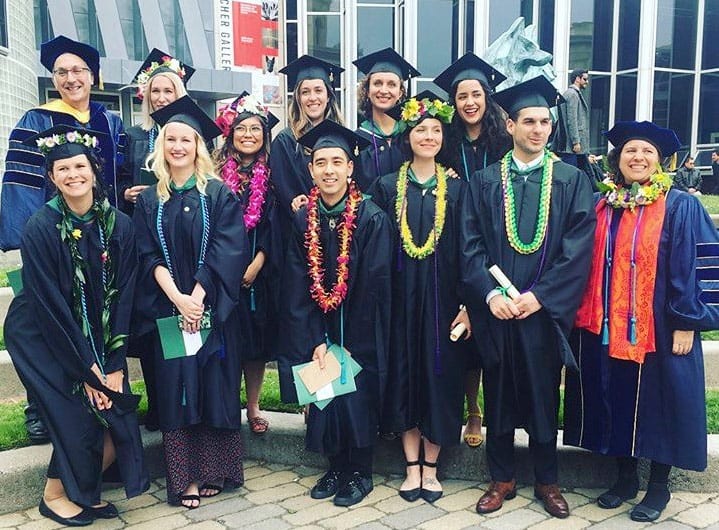
Why We Sat During The National Anthem
The graduating class of 2018, made up of Master of Arts in Urban Affairs students and Master of Public Affairs students, recently reflected on a decision they made during their graduation ceremony. Four of the students share their experiences here.
 Jessica Lindquist, Master of Public Affairs
Jessica Lindquist, Master of Public Affairs
A few days before graduation, my friend Amy mentioned to my cohort that last year the Urban Affairs students sat down for the National Anthem during the graduation ceremony to protest the racial injustice and oppression that plagues America. It took only moments for us to collectively decide we, both the Urban Affairs students and the Public Affairs students, would continue the tradition. I sat down to honor American heroes: the courageous nonviolent protesters who have at times risked everything to bring attention to the thousands of people who have lost their lives to police brutality and state violence. I sat down because as a white woman, society has endowed me with a tremendous amount of privilege that I did not earn. Toni Morrison said, “if you have some power, then your job is to empower somebody else.” I sat down to be in solidarity with all those who are fighting for civil rights amid the most blatantly racist administration we have had in modern history. I sat down because through my own research I have seen how the financial services industry has been a major culprit of institutionalized racism in our county. What we did was a small symbolic action but I know it’s just the beginning. I’m eager to see what contributions my cohort makes to advance racial equity in our communities.
 Bernice Rosas Belmonte, Master of Public Affairs
Bernice Rosas Belmonte, Master of Public Affairs
At one point after the National Anthem and midway through the graduation ceremony, a woman behind me leaned forward and asked why we sat down. “As a sign of protest,” I replied. “Yes, but why?” For a quick second, I hesitated not expecting her to ask another question. “Because we are protesting institutionalized racism and police violence. We are sitting because we are acknowledging that.” The woman said nothing and slid back in her seat. Yes, we were graduating today, but our degrees represent much more than a piece of paper. Our degrees represent two years of learning about economic, class, race and power struggles in our society and exploring solutions to these problems. We spent two years highlighting injustices and working towards solutions that can create a real, positive impact in our communities. We sat because we are non-conformist. We sat because each of us has seen society’s problems and have decided to dedicate our lives to work for the common good. We sat because this one action is just one of many actions we are going to take make a positive impact. We sat because we are in this together.
 Amy Dundon, Master of Urban Affairs
Amy Dundon, Master of Urban Affairs
I sat during the national anthem because I am unwilling to accept or tolerate (let alone celebrate) the distraction of patriotism. I also sat because we, as a group, sat; I sat because my freedom is entirely contingent on the freedom of others (Lorde 1981). I sat to honor the lives risked and lost in crossing to get to this country; I sat out of love for those wrongfully relegated to silence, to detention, to death; I sat because Black lives matter. I sat in reverence for the 2,358 lives lost to police violence since the year I began graduate school (Tate, Jenkins and Rich 2018). I sat because I had to check that number this morning. I sat out of respect of others who have sat, knelt, raised fists before I even thought to remain seated. I sat to honor those that are disciplined, ridiculed, or met with violence for their own acts of protest; I sat in solidarity. I sat because it would have been dishonest to stand.
 Bri Gonzalez, Master of Public Affairs
Bri Gonzalez, Master of Public Affairs
Our cohort had just spent the past two years learning about the racial, economic, and social injustices that plague people of color in America, so it was only fitting that we would sit during the anthem while we graduated from the institution that opened our eyes to these oppressions. We protested and will continue to protest, a country that marginalizes groups based on the color of their skin and the shallowness of their pockets. We protested because of the never-ending cycle of gun violence that kills hundreds of children and people of color each year, yet is ignored by our leaders so as to not upset the NRA and the Republican base. We protested because the groups who are being gunned down by the police are not even allowed to protest the atrocities they endure without facing repercussions. In Ferguson and Baltimore, they were called rioters and were met with more violence by the same police force that had just murdered members of their community. In the NFL, players will now be fined if they kneel for the anthem, a blatant display of oppressing black and brown men. We protested because the Second Amendment is deemed more valuable than American lives. There are many reasons why we protested, and each of us may have our own versions, but we all agree that our country cannot continue down this path. Our gesture might have been small, but it was done to stand in solidarity with those who are fighting against these injustices and it is when we are all in solidarity that change can reverberate across the nation.
Works Cited
Lorde, Audre. 1981. Sister Outsider: Essays & Speeches by Audre Lorde. Berkeley: Crossing Press.
Tate, Julie, Jennifer Jenkins and Steven Rich. 2018. “2018 police shootings database: Fatal Force.” The Washington Post. https://www.washingtonpost.com/graphics/2018/national/police-shootings-2018/?utm_term=.41ecdc06633e
